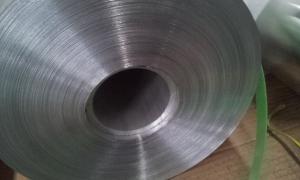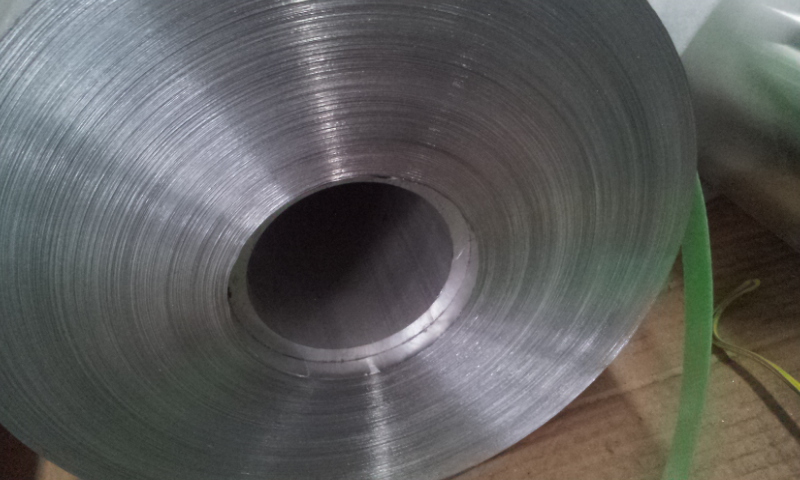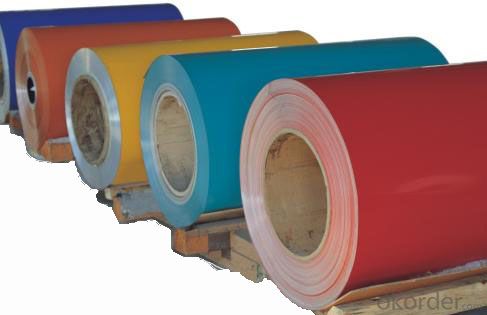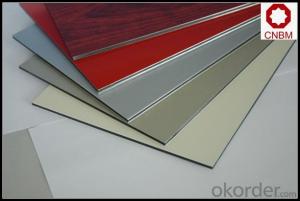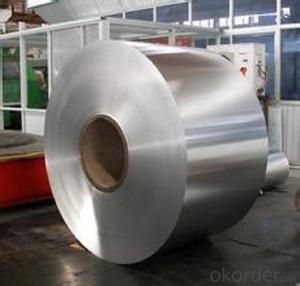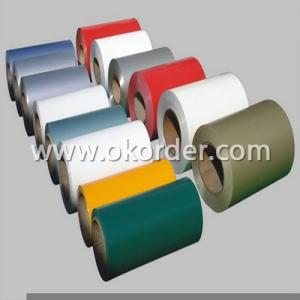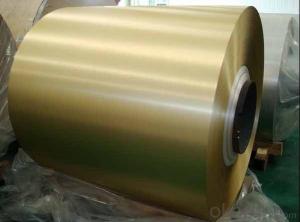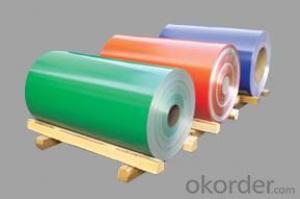Recycled Aluminum Coil Roll Price for Continuous Casting Aluminum Coils for Color Coated
- Loading Port:
- Shanghai
- Payment Terms:
- TT OR LC
- Min Order Qty:
- 5 m.t.
- Supply Capability:
- 500 m.t./month
OKorder Service Pledge
OKorder Financial Service
You Might Also Like
Specification
1.Structure of Continuous Casting Aluminium Coils for Color Coated
Continuous Casting Aluminium Coils for Color Coated is one semi-finished aluminium material. This strip can be rolled down to aluminium coil,sheet,circle ect. The alloy AA1050 is widly used in building, industry ect. Its weight is much lower than steel. So many customers choosed aluminium material instead of steel.
2. Main features of Continuous Casting Aluminium Coils for Color Coated
a.Competitive price---We have our own mills and can produce mill finished aluminium coils, so we can control the production cost better.
b.Professional after-sale service---We have more than 15 years exportation experience and you need not worry about the exporation problems.
c.Fast delivery time---We can control the delivery time within 35 days.
3. Image
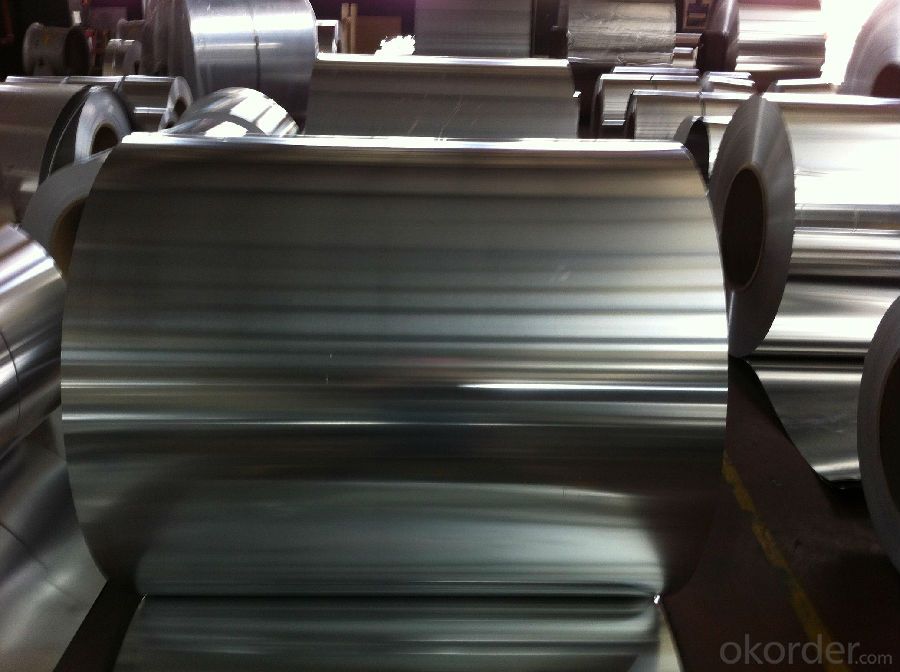
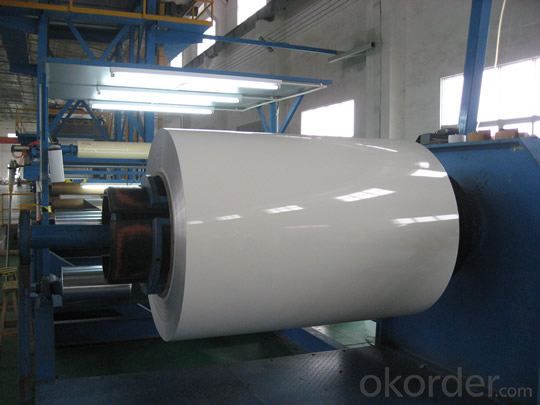
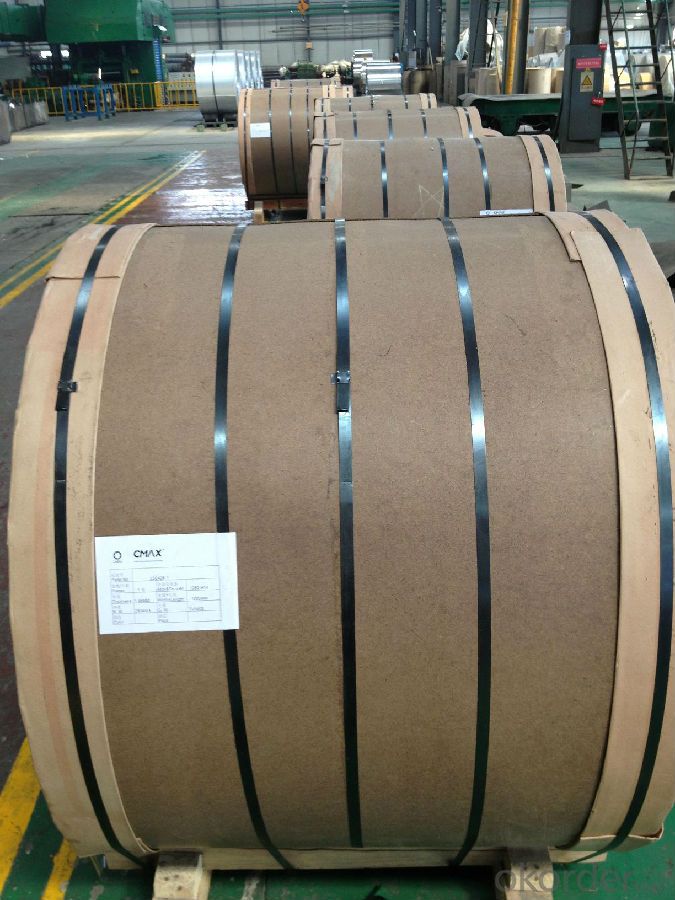
4. Product Specification
| ALLOY | TEMPER | THICKNESS | WIDTH | WEIGHT |
| AA5052 | H14 | 0.2MM-3MM | 1000MM-1500MM | 2 TONS |
5.FAQ:
What is the quality standard?
---Usually our standard is GB3880-2006
What is the largest width?
---It is 2300mm
What is the MOQ?
---Usually we can accept 80 tons.
- Q: Can aluminum coils be customized to specific requirements?
- Indeed, specific requirements can be accommodated through customization of aluminum coils. The versatility of aluminum coils allows for a broad range of specifications and applications to be met. Customization options encompass alloy selection, coil thickness, width, and length, as well as diverse surface treatments like coatings, finishes, and embossing. Furthermore, mechanical properties such as strength, flexibility, and corrosion resistance can be tailored to individual needs. To achieve desired outcomes, close collaboration with manufacturers or suppliers possessing the necessary expertise and facilities is necessary. Whether for the aerospace industry, automotive sector, construction projects, or any other usage, aluminum coils can be tailor-made to fulfill specific requirements and deliver optimal performance.
- Q: What are the common applications of aluminum coils?
- Due to their unique properties and versatility, aluminum coils are extensively used in various industries. They have numerous applications, some of which are highlighted below: 1. HVAC Systems: Aluminum coils play a crucial role in heat transfer in air conditioning and refrigeration systems. Their lightweight nature and excellent thermal conductivity make them an ideal choice for these purposes. 2. Transportation Industry: The automotive and aerospace industries commonly employ aluminum coils in the manufacturing of radiators, condensers, evaporators, and other heat exchange components. Aluminum's high strength-to-weight ratio helps in reducing the overall vehicle weight, resulting in improved fuel efficiency. 3. Construction Sector: The construction industry widely utilizes aluminum coils in the production of gutters, downspouts, roofing, and cladding materials. Aluminum's corrosion resistance and durability make it the preferred choice for outdoor applications that require long-lasting performance. 4. Electrical Industry: Aluminum coils are excellent for the production of cables, wires, transformers, and power distribution systems due to their exceptional electrical conductivity. 5. Packaging Industry: Aluminum coils are extensively used in producing various packaging materials, including cans, foils, and containers. Aluminum's ability to create a barrier against moisture, light, and oxygen makes it ideal for preserving the freshness and quality of food and beverages. 6. Marine Applications: The marine industry relies on aluminum coils for the manufacturing of boats, ships, and other offshore structures. Aluminum's resistance to corrosion in saltwater environments makes it suitable for these applications. 7. Industrial Equipment: Aluminum coils are utilized in various industrial equipment, such as heat exchangers, condensers, and evaporators. Their thermal conductivity and corrosion resistance properties enable efficient heat transfer. In conclusion, aluminum coils find widespread use in several industries, including HVAC, transportation, construction, electrical, packaging, marine, and industrial equipment. Their lightweight nature, excellent thermal conductivity, corrosion resistance, and durability make them highly desirable for a variety of applications.
- Q: What is the maximum coil weight for aluminum coils?
- The maximum coil weight for aluminum coils can vary depending on the specific grade and thickness of the aluminum being used. However, in general, aluminum coils can typically range from a few hundred pounds to several thousand pounds in weight.
- Q: This question asks about potential health hazards associated with the use of aluminum coils.
- <p>There are concerns regarding the use of aluminum coils, particularly in cooking and food preparation, due to the potential for aluminum to leach into food. While aluminum is generally recognized as safe, excessive intake over a long period has been linked to various health issues, including neurological disorders and cognitive impairment. However, the risk is considered low for most people, as the body does not absorb a significant amount of aluminum from food or cookware. It's important to note that the scientific community has not reached a consensus on the extent of these risks, and further research is needed. To minimize potential exposure, it's recommended to use alternative cookware materials like stainless steel or cast iron, especially for acidic foods that may increase aluminum leaching.</p>
- Q: What are the different coil uncoiling options for aluminum coils?
- Aluminum coils have a range of coil uncoiling options available to them, catering to specific needs and requirements. One method commonly employed is manual uncoiling, where the coil is carefully unwound by hand. This approach is typically used for smaller coils or situations that demand precision and control. Manual uncoiling enables the delicate handling of the aluminum coil and is frequently favored in smaller scale operations. Another alternative is mechanical uncoiling, which employs machinery or equipment to unwind the coil. Mechanical uncoiling is suitable for larger coils or high-volume production. It facilitates faster and more efficient uncoiling, reducing the labor involved in the process. Moreover, specialized uncoiling machines exist to accommodate specific requirements. For instance, certain machines are designed to handle delicate or sensitive materials and offer features such as adjustable tension control to prevent any damage to the aluminum coil during uncoiling. Additionally, there are custom uncoiling solutions that can be tailored to meet specific needs. These solutions may employ different mechanisms or techniques to ensure the safe and efficient uncoiling of aluminum coils. Ultimately, the choice of coil uncoiling option depends on factors such as coil size, production volume, required precision, and any specific needs or constraints of the application.
- Q: How are aluminum coils used in the production of heat exchangers?
- The production of heat exchangers heavily relies on aluminum coils, which have a crucial role in the process. Heat exchangers, devices utilized for transferring heat between multiple fluids, are capable of efficiently heating or cooling in diverse applications. The primary reason for employing aluminum coils in heat exchanger production is the distinct properties possessed by aluminum. First and foremost, aluminum serves as an exceptional heat conductor. It exhibits high thermal conductivity, enabling effective heat transfer from one fluid to another. This characteristic plays a pivotal role in heat exchangers, guaranteeing swift and efficient heat exchange. Secondly, aluminum is both lightweight and boasts a high strength-to-weight ratio. Consequently, it is an ideal choice for heat exchangers, facilitating the creation of compact and lightweight units that can be effortlessly installed in various systems. The lightweight nature of aluminum coils also reduces the overall weight of the heat exchanger, which proves advantageous in weight-sensitive applications such as the automotive or aerospace industries. In addition, aluminum coils possess outstanding resistance to corrosion. Aluminum naturally forms a thin oxide layer on its surface, thus safeguarding it from corrosion. This resistance is critical in heat exchangers, which frequently come into contact with diverse and potentially corrosive fluids. By employing aluminum coils, the longevity and durability of the heat exchanger are ensured, averting premature failure or damage. Moreover, aluminum coils are highly malleable, allowing for easy shaping into various sizes and forms. This manufacturing flexibility enables the production of customized heat exchangers tailored to specific applications and requirements. The ability to shape aluminum coils also facilitates the design of intricate heat exchanger geometries, optimizing the heat transfer surface area and enhancing overall performance. To summarize, aluminum coils are extensively utilized in heat exchanger production due to their high thermal conductivity, lightweight nature, corrosion resistance, and malleability. These properties make aluminum an ideal material for efficient heat transfer, compact designs, durability, and customization. Altogether, aluminum coils contribute significantly to the efficacy and reliability of heat exchangers in diverse industries and applications.
- Q: Are aluminum coils applicable in the manufacturing process of automobiles?
- <p>Yes, aluminum coils are widely used in automobile manufacturing. They are utilized in various components such as engine parts, body panels, and wheels due to their lightweight, corrosion resistance, and strength. Aluminum's recyclability and energy efficiency also make it an environmentally friendly choice for the automotive industry.</p>
- Q: Are aluminum coils easy to install?
- Yes, aluminum coils are generally easy to install. They are lightweight and flexible, making them convenient to handle and position during installation. Additionally, they can be easily cut and shaped to fit the desired space, making the installation process relatively straightforward for experienced professionals or DIY enthusiasts.
- Q: I go on a trip once a year with a group of lets say 10 people, we go for 7 nights and consume on average approx 120 cans of beer each (throughout the week). We have a fire burning the whole time in a hole that we dig approx 1ft deep, then we dispose of each can in the fire and let them melt down never thinking about them again. That's approx 1,200 cans that melt in the one fire hole.Will the aluminum have an affect on the soil? does anyone know what sort of damage this can cause? and for what distance / area around the fire might be affected?The theory amongst the group is that cans do not hurt anything so that's why they take cans instead of glass.Thanks
- Aluminum is very reactive in air and will form a layer of aluminum oxide around the outside of any piece. This oxide layer is very stable which is why aluminum doesn't corrode. Since your block of aluminum will be totally oxidized being in a fire, it's inert and just going to sit in the hole for the foreseeable future. The burning paint might not be healthy to breath but that's about the only hazard. Most common soil is a mixture of aluminum, carbon and silica compounds anyways so you aren't even adding anything particularly exotic. Alternatively, you could bring along a couple fifths of whiskey. It's lighter and has less packaging so it's the environmentally friendly way to get drunk.
- Q: for purchasing aluminium are the grades to be mentioned
- If it is a product for work, yes engineers and purchasers specify the grades. If for hobby then it is up to you. Common extruded shapes (beams, tubes, angles) - 6061-T6 - 6063-T5 -T6 specifies tempering class. Actually both alloys come in various T4, T5, etc., the above are just two common combinations. 6061 is a little stronger, and T6 gets its strength up quite good. Beware that welded joints are weaker since heat removes the strength from tempering. Some common sheets - 6061 (strength) - 5052 (strength, welds better than 6xxx, good formability) - 5068 (some call it 'marine grade' for corrosion resistance) Sheets can come in many alloys.... you may get cheaper grades if you don't need one of these. (if you are casting - there's whole other system of grades.) The above are just common grades. For high strength requirement you may need a specific grade in the 7xxx family.
Send your message to us
Recycled Aluminum Coil Roll Price for Continuous Casting Aluminum Coils for Color Coated
- Loading Port:
- Shanghai
- Payment Terms:
- TT OR LC
- Min Order Qty:
- 5 m.t.
- Supply Capability:
- 500 m.t./month
OKorder Service Pledge
OKorder Financial Service
Similar products
Hot products
Hot Searches
Related keywords
